Advertisement
Fast Runners And 'Warm Hugs': A Coach's Legacy Lives On In Brooklyn

As a young girl growing up in Brooklyn, New York, Cheryl Toussaint was fast.
Toussaint would race against other kids in her neighborhood. But she didn’t know you could join a team — or that the sport could change your life.
But when Toussaint was 13, she heard about a youth summer program that was holding a track meet at a nearby school yard.
"Some of my friends from the neighborhood were saying that they had racing going on out there," Toussaint says. "And, since I'm always racing the kids on the block, and I'm usually doing pretty good against them, why don't I go out and run against some real runners?
"I saw something extraordinary. I saw young women, young girls, actually doing strides and calisthenics in a group. They looked like they were having fun. They were very organized. They had on uniforms. And it just made me stop and watch and try to sort of understand — remember I'm 13 now — what on earth is going on out here?"
Toussaint was wearing a dress and sandals. She borrowed a pair of pants, sneakers and a T-shirt from a friend, and she entered a 100-meter race.
"Totally unprepared, not dressed properly — and ended up finishing fourth," Toussaint says.
"It just made me stop and watch and try to sort of understand — remember I'm 13 now — what on earth is going on out here?"
Cheryl Toussaint
All three girls who finished ahead of Toussaint belonged to the same running team. After the races were over, the girls started practicing with their coach.
Toussaint stuck around and watched.
"I was pretty determined to find out who they were," Toussaint says.
After the practice ended, Toussaint asked one of the runners about the team.
"She said, ‘Hey, it’s open to girls in the neighborhood. You need to go over there and ask that gentlemen if you can come to practice.’ "
That “gentleman” was the team’s coach: Fred Thompson.
Thompson ran track at the City College of New York. In 1958, nine years before the first African American would sit on the Supreme Court, Thompson graduated from law school at St. John’s University. In 1963, he founded this team: the Atoms Track Club in Brooklyn. It was for girls and young women, at a time when there weren’t many organized sports opportunities for girls.
"Girls are given a jump rope, maybe nothing else," Thompson said in a 1979 episode of the show "Real People." "So what we are doing is giving them competitive experiences. And the competitive experiences enhances their feeling of personal worth. They realize how good they are. The girls who wear the Atoms jackets are girls who have achieved things."
Advertisement
And, three years after Fred Thompson founded the Atoms Track Club, 13-year-old Cheryl Toussaint approached him.
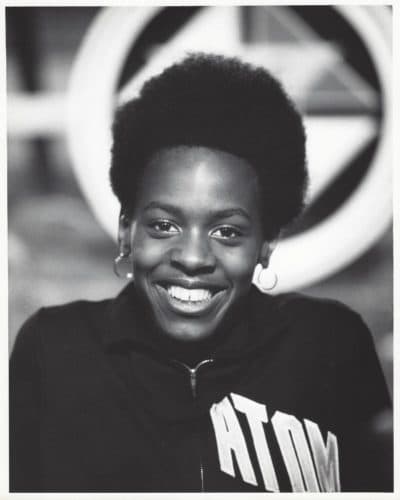
"He said, 'Where do you go to school?' " Toussaint recalls. "That was his first question, after asking me my name."
Next he asked Toussaint if she’d ever run before. She said no.
"He said, well, if I'm interested, the team practices every day after school at three o'clock, and all I needed to do is wear my sneakers. And I could wear shorts, or if I had a gym suit I could bring that, and show up,' " Toussaint says. "And I did. And I did.
"And, when I got there, it was, like, serious business going on. I mean, the girls had a routine. They came in with their books, their bags."
While they waited for practice to start, many of the girls did homework.
"They were very disciplined. They knew that they had to get in certain things before practice started," Toussaint says. "And when practice was over, everybody sort of gathered in groups and started heading home together."
Toussaint says this sort of structure and organization was new for her. She stuck around, and she learned more about her new coach.
Track Coach, Teacher Of Life
At first, Coach Fred Thompson might sound like the sort of committed coach you’ve heard about before: a strict disciplinarian and also something of a father figure — one of those coaches who requires their athletes to bring in their report cards every quarter.
But Fred Thompson went beyond that. He spent his own money on the team.
"He’s crazy, you know," former Atoms runner Lorna Forde said on that same 1979 episode of the show "Real People." "He takes his whole income and he just spends it on us until 'well, maybe I’ll get it back when I get funds' and stuff like that. And nobody would do it. Nobody."
"[Fred Thompson] takes his whole income and he just spends it on us."
Lorna Forde in 1979
Toussaint says Thompson also taught his runners how to best fold The New York Times and how to properly use silverware.
"It was amazing that he took that kind of interest in the detail of helping to groom us," Toussaint says. "He said it was very important how we carried ourselves as young women, as young Black women, as representatives of our families, of our community and of our country."
Cheryl Toussaint, An Olympian
That last part, about being a representative of the country, would be particularly relevant to Cheryl Toussaint.
Because after finishing fourth in that race against girls from the Atoms Track Club in her friend’s pants, sneakers and T-shirt, Toussaint got better and better. Her race was the 800 meter.
She was among seven Atoms runners who qualified for the 1972 U.S. Olympic trials. There she could earn a spot at the Olympic Games.
Thompson took a leave of absence from his day job to focus on helping his runners.
“Let’s just say that I’ll be very happy to go back to work in September,” he told The New York Times that summer. “Right now I am not the richest man in the world. Matter of fact, I’m broke.”
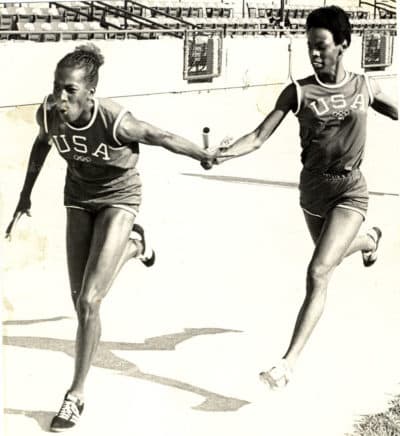
Toussaint remembers the night before the U.S. Olympic qualifier.
"That entire night I don't even think I slept. I really don't," she says. "I had a roommate. And I looked over every now and then, and I thought, 'Oh, she looks like she's resting pretty well.' I don’t know if she was. But I just remember my eyes were closed. The palms of my hands were sweating, you know, were moist. And I thought, 'I'm not going to have the energy to run this race.' ”
Toussaint did have the energy. She qualified, becoming the first member of the Atoms Track Club to make the Olympics.
Fred Thompson was there in Munich to see Cheryl Toussaint win a silver medal in the 4x400 meter relay.
Inheriting The Colgate Women's Games
After the Games, Toussaint says Thompson and the Atoms Track Club got a lot of positive attention — not just because Toussaint had gone to the Olympics, but because so many of the other girls were getting to college on scholarships.
Thompson was about to get some financial support.
The Colgate-Palmolive company learned about the team from a TV report, and they partnered with Thompson to create something called the Colgate Women’s Games — a series of track meets that would draw girls and women not just from Brooklyn, but all up and down the East Coast.
Thompson became the full-time director of the games, which began in 1974.
Toussaint competed in the second edition of the games — then she started working alongside her coach at the Colgate Women’s Games. And over the next two-plus decades she worked her way up from meet coordinator to assistant meet director in 1999.
As the years passed, Thompson put an idea in Toussaint's ear.
"That one day I would be the likely — or a likely candidate — to be the meet director whenever he would, I guess, decide to retire," Toussaint says. "He felt I had the passion for it, I had the knowledge of it, and that I had earned over the years the respect of my peers and coworkers."
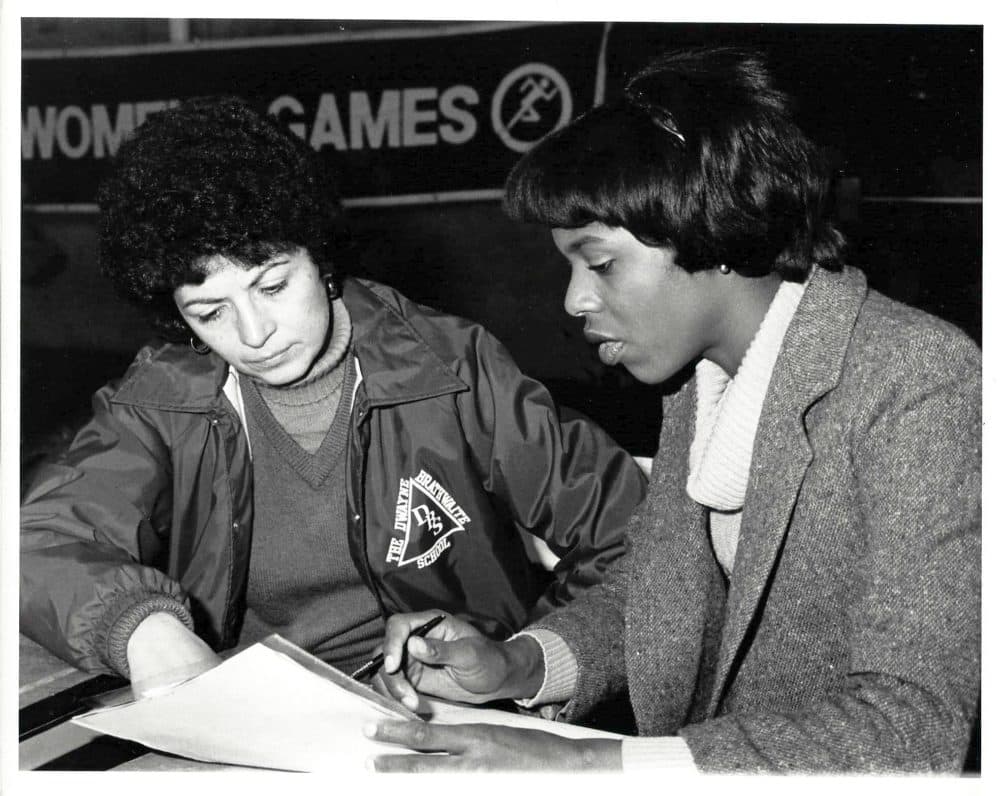
But Toussaint had some doubts. After all, she thought, this was largest and longest running girls' track series in the country.
"I felt, 'Wow, that's pretty daunting,' " Toussaint says. "And so I wasn't too sure that that was where I would end up."
But Toussaint says she was being primed the whole time to take over for Thompson. And she says just like in her own running career where she kept improving and advancing, she’d also been building her skill set to take over the Colgate Women’s Games.
"So when the time came and he was sort of saying, 'I think I'm going to have to step down, and you would be the one' ... I just, at that point, I acquiesced: 'OK, I'm ready,' " Toussaint says with a laugh.
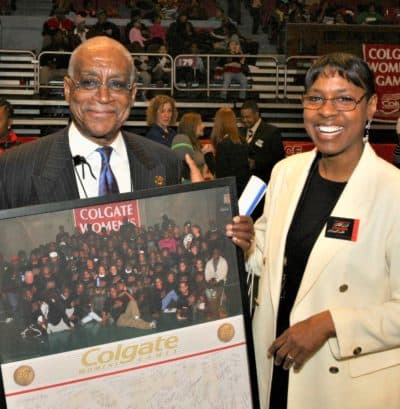
Thompson retired in 2014. Toussaint took over as meet director.
In the coming years, Thompson's health declined. In January 2019 he died of Alzheimer’s.
The following December, Toussaint oversaw the first Colgate Women’s Games since Thompson's death.
"It was tough, no doubt about it," Toussaint says. "You can never prepare yourself to lose someone as great and as grand as he was."
Before the last day of racing, Touissant addressed the 200-plus runners who had made the finals, and she had an announcement:
I also want to share with you that the founder and the director — former director of the Colgate Women’s Games — the late Fred Thompson was inducted into the USA Track and Field Hall of Fame.
Toussaint says every time you think about an athlete who comes through the Atoms Track Club or through the Colgate Women’s Games, it’s a reflection of what Fred Thompson has done.
The Future Generation Of Fred Thompson's Legacy
Brooke Sheppard, 12, first competed in the Colgate Women’s Games in 2015.
"I didn't think it'd be really fun," she says, "because I used to see my baby sitter's daughter run, and she looked so tired. So I was really scared, but, I mean, it was actually really fun and I wanted to continue."
Brooke and her sisters Rainn, 14, and Tai, 15, grew up in Brooklyn, just like Cheryl Toussaint.
They’re all fast (they’ve won Junior Olympic medals) and they all compete at the Colgate Women’s Games.
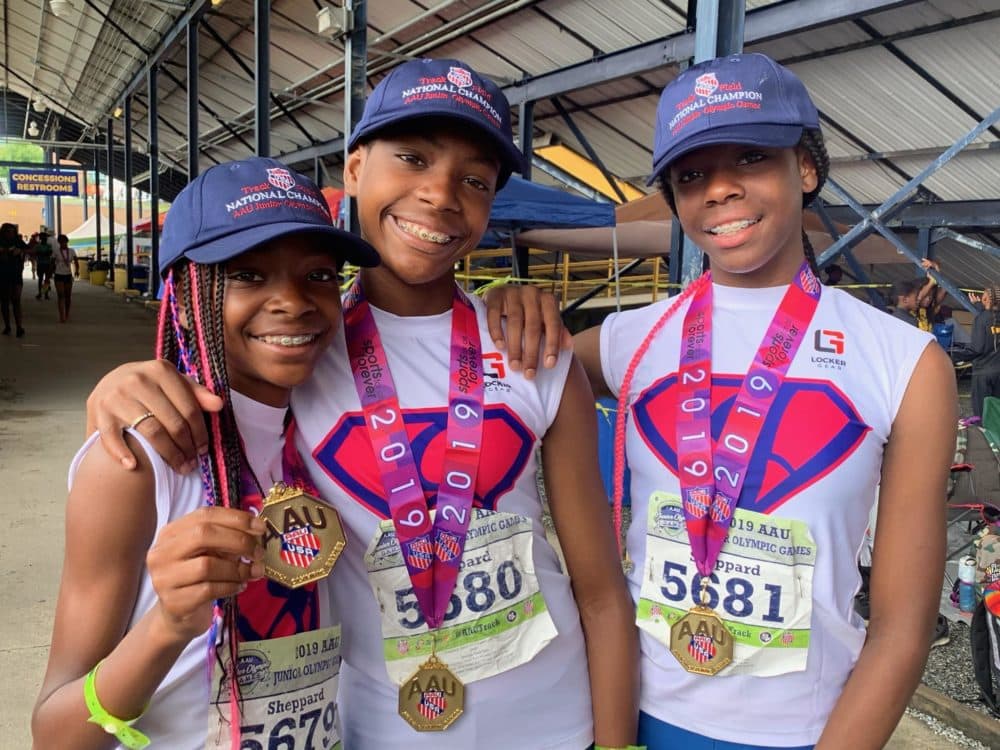
"Cheryl Toussaint is very nice," Tai says. "We’ve seen her a couple of times, and she always says hi to us and gives us warm hugs, and then she always tells us how amazing we’re doing and gives us good luck.
"She’s an amazing person, and she inspires me because she's an Olympian —she was an Olympian ... I want to be like her a little bit."
About four years ago, the Sheppard sisters and their mother experienced homelessness. But thanks in part to the publicity generated from the sisters’ running success, filmmaker Tyler Perry learned about the family and decided to help.
Brooke, Rainn and Tai Sheppard are already thinking about their futures: college and, hopefully, the Olympics.
Until then, they'll compete at the Colgate Women’s Games — founded by Fred Thompson, now run by Cheryl Toussaint.
Amidst the pandemic, Colgate hasn’t yet made an announcement about the upcoming Colgate Women’s Games, scheduled to begin in December. The company says "it's committed to continuing to support the community in 2020 and beyond."
This segment aired on August 15, 2020.
